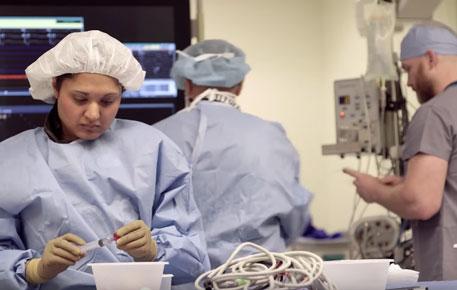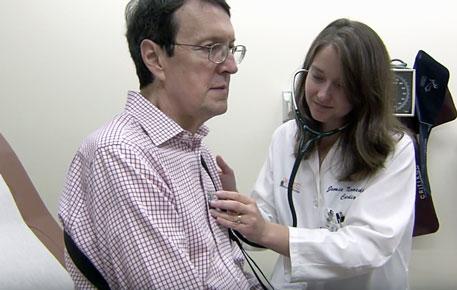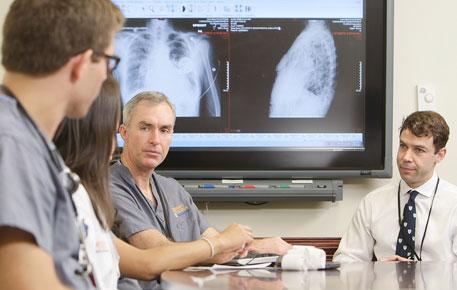Cardiac Arrhythmia: Heart Rhythm Disorders

Make an Appointment
For the Charlottesville area:
For Northern Virginia:
Sometimes feeling dizzy or like you're going to faint? Trouble breathing? Does your heart pound or flutter? You're probably worried. You have questions about your heart health. You might even wonder about your heart stopping. These issues could be a sign of a heart rhythm disorder.
Heart rhythm disorders happen when you have electrical problems in your heart. They can cause your heart to beat too fast or too slow. Or, your heartbeat might be uneven sometimes. The heart rhythm experts at UVA Health can answer your questions. If you have an irregular heartbeat, we're here to help.
UVA Health's Heart Rhythm Disorder Treatment
At UVA Health, we're always exploring new ways to treat and manage heart rhythm disorders, also called arrhythmias. Our arrhythmia care was the first of its kind in Virginia. We've since helped tens of thousands of patients manage their heart arrhythmia.
We offer a range of advanced treatments you can't always find nearby. And you'll have access to clinical trials as part of our research center.
Our heart rhythm program is a tertiary referral center. That means you'll get personalized care from our deeply experienced team using state-of-the-art equipment.
Nationally Recognized Heart Care
We've been nationally recognized and received several awards for our heart care, including from the American Heart Association, U.S. News & World Report, and others. Becker’s Hospital Review again named UVA Health’s Heart & Vascular Center to its list of 100 hospitals and health systems with great heart programs.
See other awards and recognition for our heart care.
Cardiac Arrhythmia: Heart Rhythm Disorders
When you have a heart rhythm disorder, it affects how your heart pumps, your blood pressure, and your pulse. See Pamela Mason, MD, discuss what arrhythmias are, what causes them, and how we treat arrhythmias at UVA Health.
My name is Pamela Mason and I am the chief of cardiac electrophysiology at the University of Virginia. So arrhythmia is a way of saying that a patient has an abnormal heart rhythm. The rhythm of the heart affects how the heart pumps, it affects the blood pressure, it affects a patient's pulse. The most common symptom that patients with heart rhythm abnormalities experience is what we call palpitations, which is the sensation of a rapid or pounding heart rhythm. Some patients, however, don't have any symptoms at all. And another symptom that's particularly of concern to us is passing out. Heart rhythm disorders can be caused by a lot of different situations. The most common situation is in patients who have other forms of heart disease. Patients who've had prior heart attacks or heart failure are particularly at risk for heart rhythm abnormalities. However, there are some genetic components, and so we do see some patients who have no structural heart disease at all who do experience arrhythmias. For our patients with heart rhythm disorders, there's a lot of different treatment options. For some of these conditions, medications can be extremely effective in treating them successfully. Other patients do need procedures. The procedures that I perform fall into two main groups. The first group is patients getting implantable devices, and this includes pacemakers or implantable defibrillators. These are small surgeries. They're almost always outpatient, but the patient will leave with a new device, usually implanted in their left shoulder, which can help control the rhythm of their heart. The other group of procedures that I perform are called ablation procedures, and these are catheter-based procedures that we do to get rid of fast heart rhythm abnormalities. Patients with heart rhythm disorders should choose UVA Health because they get access to the latest technology in a multidisciplinary comprehensive environment.
How Are Heart Rhythm Disorders Treated?
Heart rhythm disorders are treated in 3 main ways:
- Medications can control heart rhythm or prevent other issues, like blood clots
- Therapies, like vagal maneuvers or cardioversion, can bring your heartbeat back to normal
- Surgery and other procedures can be used to put in a device or directly treat your heart's electrical paths
Heart Devices for Rhythm Issues
Heart devices help us diagnose, manage and treat your heart rhythm disorders. Some, like pacemakers, need surgery to implant them.
See how heart devices can help you with your arrhythmia.
Genetic Counseling for Rhythm Disorders
Some heart and vascular conditions run in the family. That might mean there is something in your genes that causes it. Your genes are like instructions for creating and running your body. You get them from your parents.
Our genetic counselors can check you and your family members to see if you’re at risk for arrhythmia. They can also check if you have other health problems that could cause arrhythmias.
Don’t Ignore the Signs of Rhythm Issues

Sharon's Tachycardia Story
On Christmas Day, Sharon Flynn fainted at her friend's house. It wasn't the first time. Her symptoms were caused by tachycardia, a type of arrhythmia. Treating her tachycardia at UVA Health got her back to her active lifestyle.
- AblationSurgical and Nonsurgical Ablations
UVA is a leader in afib ablations with very little or no use of fluoroscopy, which reduces your exposure to radiation. We can treat heart rhythm disorders with both surgical and non-surgical options.
- Heart DevicesHeart Devices
Your heart rhythm treatment may include pacemakers or defibrillators. We can treat sudden cardiac arrest with an innovative subcutaneous implantable defibrillator (S-ICD) that's placed under the skin.
- Rhythm ResearchSupport Afib Research
We’re a research center that’s developed MRI protocols for patients with ICDs, including programming to minimize shocks. UVA is also participating in a study that uses a robotic arm ablation.


